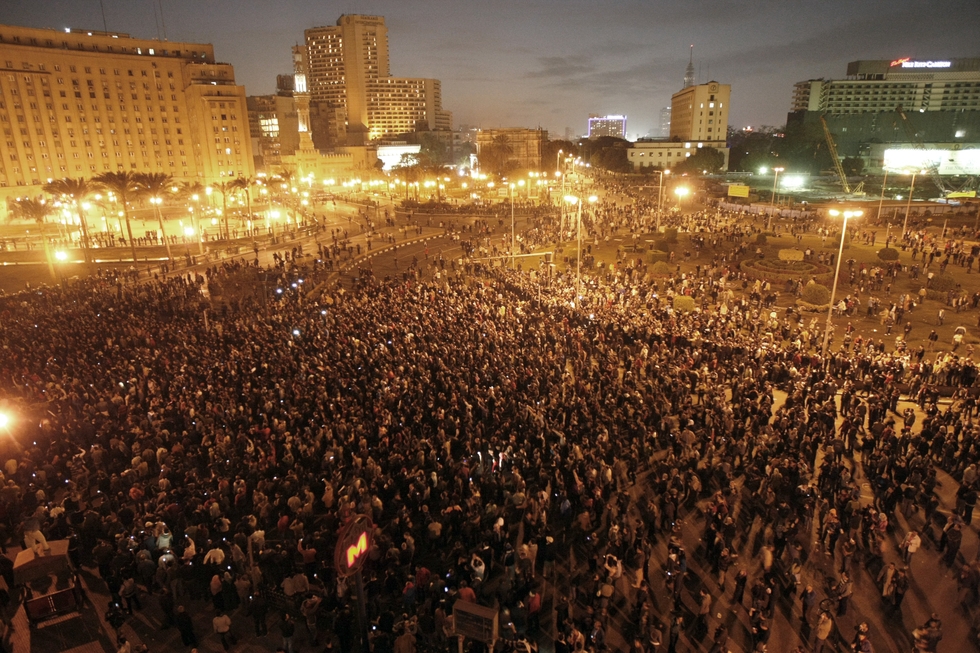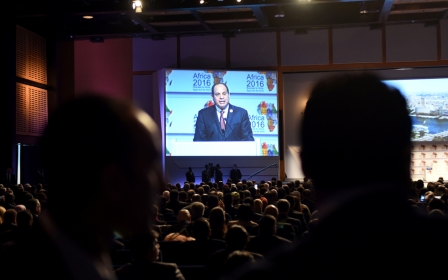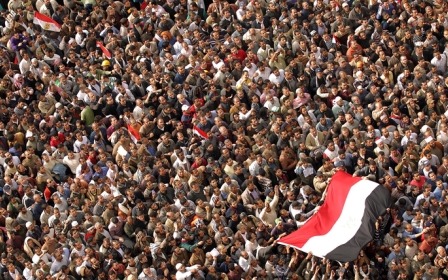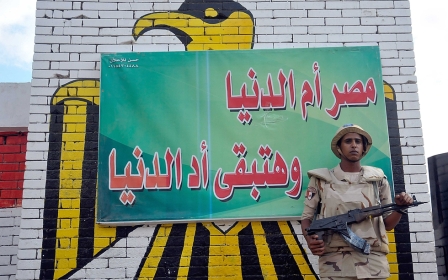Egypt without a coup: The alternative that could have been

In an interview with Jeune Afrique, Egyptian President Abdel Fattah al-Sisi, who was previously minister of defence, stated that for Egypt to achieve democracy it will require another “20 to 25 years”. That was a confession of the obvious: that in Egypt there is no democracy. Perhaps it was a better way to respond to international journalists than the usual denial of all blatant realities that Egyptian diplomacy has become so accustomed to.
There is no doubt that in Egypt there is no democracy. The current system is the product of a military coup and has an extremely poor record of basic human rights violations, which have become a common occurrence.
The current regime in Egypt likes to insist there was no alternative to the route it took. That it was bound to confront “terrorism”; that the country was on the verge of collapse and it simply had to save it from the Muslim Brotherhood. The situation in Egypt now is as devastating as the heavy blow inflicted on the dreams and aspirations of the 25 January 2011 revolution by the 2013 military takeover. The question however begs itself: did Egypt really have no alternative?
The regime now in control in Egypt is, just as in the era of former president Hosni Mubarak, making excuses not to have democracy.
Frankly speaking, the main reason why the West and the “international community” stood so silently by when the military took over Egypt is due to the fact that the coup had overthrown the Muslim Brotherhood’s president Mohamed Morsi. It would be doubtful whether the same events would have been allowed had a non-Islamist president assumed power after the revolution.
Moreover, the radical transition which saw the downfall of a president who had been elected in free and fair internationally recognised elections did not turn out as anticipated. Egypt blundered into bloodshed, prompting many of the coup’s early supporters to jump ship, including Mohamed ElBaradei - a Nobel Peace Prize laureate - who during the violent dispersal of Rabaa Square protests resigned from being the acting vice president.
Rewinding to shortly before the coup and before the 30 June 2013 protests that called for early elections, Egypt was severely polarised. The Muslim Brotherhood leadership was practically in denial, and violence against Brotherhood members by ex-regime thugs was on the increase. The Brotherhood's Freedom and Justice Party headquarters was set ablaze, and Morsi supporters were dehumanised in pro-Mubarak media.
The military then gave an ultimatum that if matters were not resolved by 3 July 2013, it would step in to resolve the situation and draw a new roadmap for the country.
At this point the intervention of the military was disastrous and undid the results of five democratic processes; a referendum on a road map after Mubarak stepped-down, elections for parliament and lower chamber of parliament, presidential elections, and finally a referendum over the post-revolution constitution - approved by over 65 percent.
Different scenario
Things might have been different had the military intervened - yes - but only as a broker, not as an actual player. The military at the time of the coup still had a great image and was not seen negatively by most Egyptians.
Furthermore there were initiatives by various political forces that aimed for national reconciliation, sharing of power, and moving forward through dialogue. These initiatives included a national coalition government, a calming down of polarising rhetoric, a transitional justice process to overcome transgressions by the Mubarak regime and others.
The military could have brokered such a process that would have been inevitable given the 30 June 2013 protests marking Morsi's year in office. Furthermore, new parliamentary elections were just around the corner. The anti-Morsi protesters could have easily been mobilised to the ballot box, making the parliament very different to the first post-revolution one, which was dominated by Islamists.
The new parliament could have called for early presidential elections which would have been constitutional.
Whatever the case was before the military intervention in Egypt, the outcome could have been overwhelmingly better. Thousands of deaths would have been avoided; tens of thousands of political prisoners would have never been incarcerated. Egyptians would have still enjoyed political freedoms.
Unfortunately, many local, regional, and international players were eager to sideline the Brotherhood at any expense and without much thought. The Egyptian political transition would have most probably been more comparable to its Tunisian counterpart, that is, much more inclusive and pluralistic.
It is highly unlikely that the insurgency in Sinai would have ballooned to what it is today, and there would have been no terrorist attacks on tourists, nor reactionary violence against an abusive security force.
The Egyptian economy would have been functioning much better than it is today, and Samih Sawiris, chairman of Orascom, Egypt’s biggest company, would not be saying that the investment environment in Egypt is the worst in the Arab world.
Today the regime is leaving no room for any possibility of moving forward with the political process, and the justice system is in a shambles - to the extent that recently Sisi had to intervene to pardon a four-year-old child who had been sentenced to life in prison.
An alternative Middle East
What happened in Egypt has undoubtedly sent shockwaves throughout the region. Egypt is the most populous Arab country and has always been a centre of gravity in the region. Political groups in the region pay serious attention to what happens in Egypt.
With the revival of authoritarianism in Egypt, other authoritarian regimes in the region have been given a strong incentive to push back against revolutionary forces seeking freedom, dignity and a better future.
With the dramatic change in Egypt, a paradigm shift overshadowed the enthusiasm of the “Arab Spring” for democracy, freedom, and inclusiveness as ideals to be sought and implemented, make such views appear as hollow ideas that can be destroyed before the eyes of the international community with no genuine objection.
With authoritarianism back, Ali Abdullah Saleh - the old dictator of Yemen - was certainly delighted as he joined forces with the Houthi militia to capture Sanaa from elected Yemeni President Abd Rabbuh Mansour Hadi. Syrian President Bashar al-Assad crossed all the “red lines” and managed to change his status from being completely rejected by the international community to someone who is accepted.
Libya's renegade general, Khalifa Haftar - who got direct aid from Egypt - managed to foil the transitional process in Libya and make room for pro-Gaddafi forces in the newly formed fragile political order.
If it can happen in Egypt then it can happen elsewhere, as they must have calculated. Coups also extended to other countries in Africa, where the continent was trying to recover from them. And let's not forget how, when the masses were suppressed, groups like the Islamic State have swollen in numbers throughout the region.
Perhaps one of the biggest setbacks for the region was the strong invitation Russia got from Sisi after the coup, which has made Moscow more daring in Syria. The Egyptian regime has strengthened relations with Russia to diversify away from its reliance on the West and thus have more leeway in decision making.
With a shaky, indecisive and morally inconsistent US that spearheads the West’s foreign policy in the region, Russian President Vladimir Putin was sure to make the most out of the opportunities open to him.
Without the coup in Egypt, the country - and probably the region at large - would have looked better. It would also be hard to imagine a genuinely better situation in the region without solving Egypt’s problems, which are primarily political and not economic. For now, Egypt can be promised democracy but ironically only after 20 to 25 years.
- Mustafa Salama is a political analyst, consultant and freelance writer. Salama has extensive experience and an academic background in Middle East Affairs.
The views expressed in this article belong to the author and do not necessarily reflect the editorial policy of Middle East Eye.
Photo: Egyptian demonstrators protest in central Cairo to demand the ouster of President Hosni Mubarak and calling for reforms on 25 January, 2011 (AFP).
Middle East Eye propose une couverture et une analyse indépendantes et incomparables du Moyen-Orient, de l’Afrique du Nord et d’autres régions du monde. Pour en savoir plus sur la reprise de ce contenu et les frais qui s’appliquent, veuillez remplir ce formulaire [en anglais]. Pour en savoir plus sur MEE, cliquez ici [en anglais].





